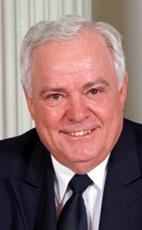Mr. Speaker, I am sorry, I was told that there was another speaker before me.
We cannot support Bill C-22, an Act respecting certain agreements concerning the redevelopment and operation of Terminals 1 and 2 at Lester B. Pearson International Airport.
Even if the purpose of this bill is to cancel an inadequate contract which, as Mr. Robert Nixon noted in his report to Prime Minister Jean Chrétien, was "arrived at with such a flawed process and under the shadow of possible political manipulation", it sets cancellation conditions which, in our opinion, are just as irregular and make us think that they are the result of more political manipulation to protect friends of the party in power.
We must first ask the following questions: Why did the government want to change the management framework of Lester B. Pearson Airport? Was the airport losing money? On the contrary, in 1993, this airport made a profit of $23 million, excluding revenues from renting Terminal 3. Did the government believe that the new consortium would offer customers better services at a lower cost? On the contrary, since the deal provides that, for air carriers, the costs would be raised from $2 per passenger now to $7 at the end of construction. And we know that carriers pass their costs on to passengers.
There was only one acceptable reason, and it was the implementation of the new policy on the future framework for the management of airports in Canada that was published by the Conservative government in April 1987. But there again, the Conservative government at the time departed from its own policy by entrusting the modernization of Terminals 1 and 2 of Lester B. Pearson Airport to a private consortium.
Indeed, the new policy on the future framework for the management of airports in Canada called for the implementation of the new approach chosen by Transport Canada; one of its two main thrusts was to emphasize the commercial orientation of airports, their possible contribution to economic development and their taking into account of local concerns and interests.
That approach called for private sector involvement, especially in traditional or innovative airport services as much as possible.
Instead of delegating the management of Pearson Airport to a local public authority similar to the ones in place in Montreal, Vancouver, Calgary and Edmonton, the government decided to favour a private consortium, thus going directly against its general policies.
It has not been proven that the decision to change the management framework of Lester B. Pearson Airport was made according to generally recognized principles of good public management. One has to look elsewhere to find the real reasons that prompted the Conservative government to sign in a rush, in the middle of an election campaign, the October 7, 1993 agreement.
We would have more luck finding the real motives behind this transaction if the present Liberal government appointed a royal commission of inquiry. We would get answers to some troubling questions. On June 22, 1987, the Conservative government selected Airport Development Corporation to build and operate terminal 3 at Pearson. Airport Development Corporation and Claridge Properties Inc. are essentially the same corporate entity. What do we know about Claridge Properties Inc.? It is a real estate company owned by Charles Bronfman, who is associated with the Liberal Party of Canada. The key people in the company are: Peter Coughlin, the president; Senator Léo Kolber, the manager of Claridge Properties; Herb Metcalfe, a lobbyist representing Claridge Properties and a former organizer for Jean Chrétien; and Ray Hession, an influential former deputy minister who had recently been appointed to the board of Paxport.
On December 7, 1992, Paxport's proposal for the privatization of terminals 1 and 2 was accepted. There were only two proposals, the other one being the one made by Claridge Properties. The companies had only 90 days to submit their bids.
Paxport was then given two months to demonstrate the financial viability of its proposal. That condition was never met. What then do we know about Paxport Inc.? It is another consortium made up of six companies associated with the Conservative Party through some key people, and I will name a few: Don Matthews, president of Paxport Inc, the former chairman of Brian Mulroney's nomination campaign in 1983 and former president of the Conservative Party; Otto Jelinek, a former Conservative minister, now a member of Paxport's board of directors; Fred Doucet, who was mentioned earlier, a lobbyist representing Paxport and long-time friend of Brian Mulroney; Bill Neville, another lobbyist representing Paxport, the former chief of staff of former Prime Minister Joe Clark and a member of the privileged transition team of former Prime Minister Kim Campbell.
What happened next? On February 1, 1993, having been unable to demonstrate the financial viability of its proposal and experiencing some difficulties, Paxport merged with Claridge under the name T1 T2 Limited Partnership. Again, T1 T2 is made up of the same companies: Claridge Properties, Paxport Inc. and the Allders Group.
All of these people have ties to either the Liberal Party or the Conservative Party.
In short, Mr. Speaker, during the whole process, the whole time these transactions were prepared, the present Prime Minister never complained and never said anything about what was going on in this matter.
It was only a few days after the announcement of the general election that the Prime Minister opposed the way it was done. For these reasons, I ask the Liberal Party and some of its supporters why they are afraid of revealing the hidden aspects of this privatization?

